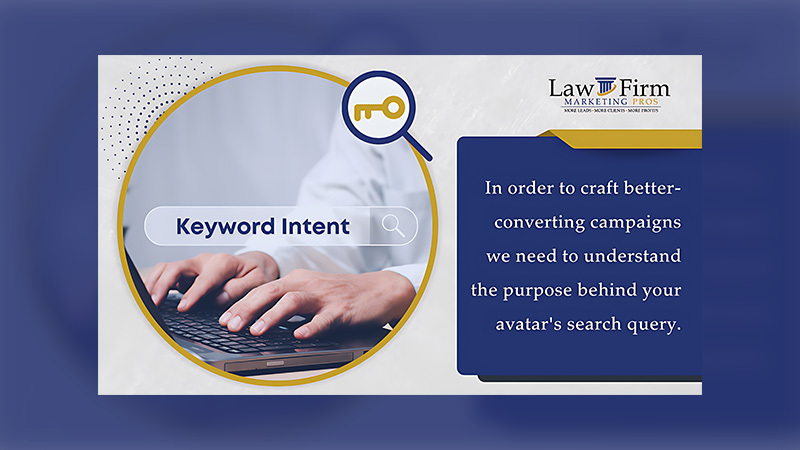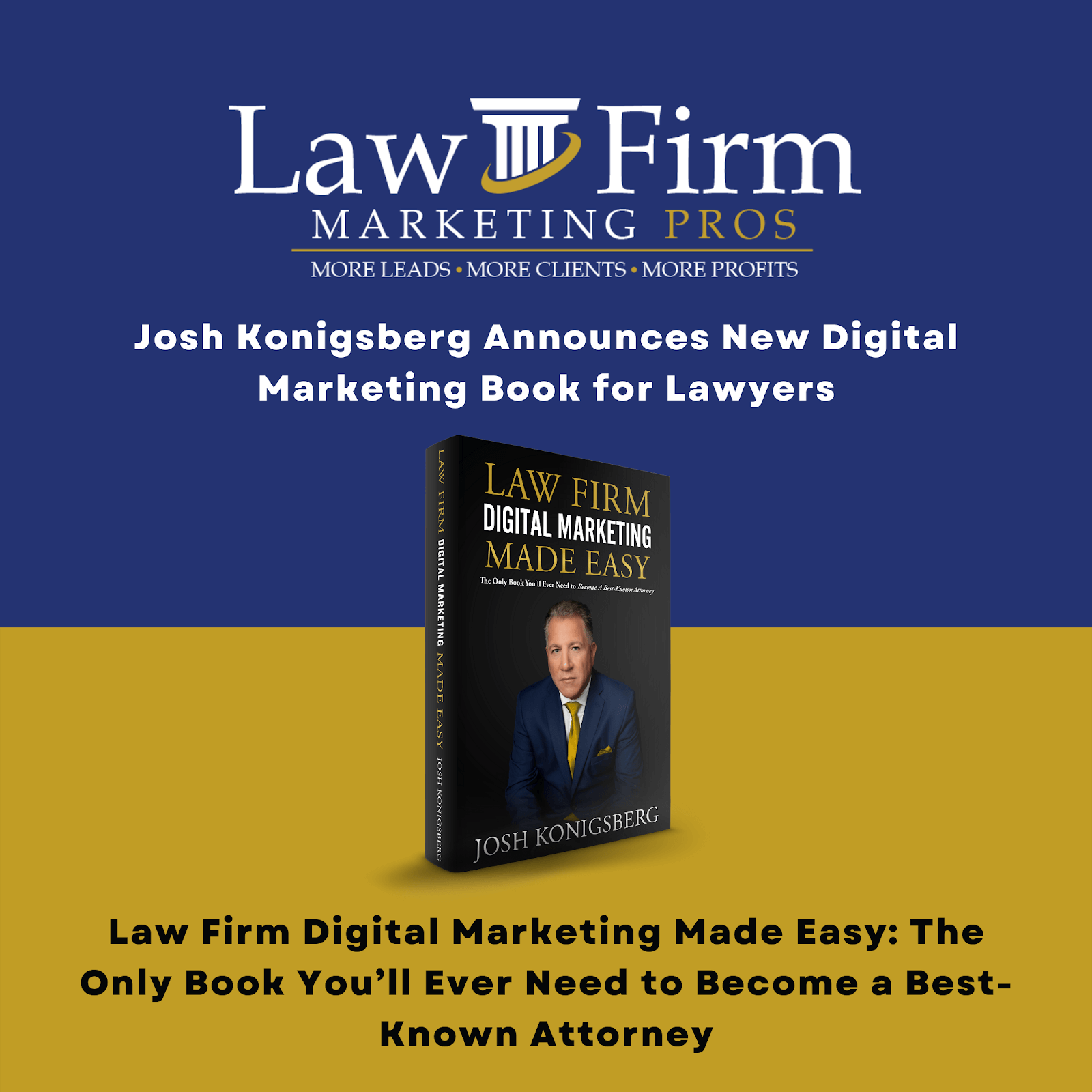When optimizing a website for search engines, keyword intent is a critical factor law firms should not overlook. As a leader in digital marketing for lawyers, we understand the importance of keyword intent when developing a successful SEO strategy. Whether it involves informational searches or a commercial investigation, we provide a few tips in this blog to help you generate more leads online.
We also explain the relevance of search intent relative to its critical role in search results and driving organic traffic to law firm websites. You’ll find practical examples and strategies to target all search intent and keyword intent and guide law firm owners in identifying and leveraging the right search intent and keyword intent for their websites.
What is Keyword Intent?
Keyword intent is a crucial concept in digital marketing for law firms. It refers to the purpose behind someone’s search query and allows you to craft better-converting campaigns. Without a thorough understanding of the intent behind your visitors’ searches, even a generously funded pay-per-click (PPC) campaign will underperform. To get the best ROI on your investment, you must master the concept of user intent and apply it to all content, including a blog, press release, landing page, service pages, and PPC pages, to achieve the goal of showing up on search results pages – preferably on page one.
Keyword intent for law firm marketing sheds light on your audience’s search intent and search intent data — terms or phrases law firms can leverage to create content that meets their needs. By understanding the user intent behind a particular keyword, you can devise more relevant and targeted PPC ads, webpages, blogs, press releases, landing pages, and social media posts that cater to the user’s desires. For example, if someone searches “law firm near me,” they are likely looking for a local law firm; therefore, you should tailor your PPC ad and all content accordingly. With an understanding of keyword intent, you can ensure that the right people see your content at the right time.
Keyword intent also identifies keywords with high commercial intent. High commercial intent keywords show that the user is ready to act, such as purchasing or signing up for services. By targeting these keywords in your PPC campaigns, your ads can reach users with the highest probability of converting into new clients for your law firm.
To get the most out of your digital marketing efforts, focus on leveraging your audience’s search intent to implement campaigns that effectively and efficiently drive conversions.

High Intent vs. Low Intent Keywords in Digital Marketing for Lawyers
Knowing the difference between high intent and low intent keywords can help you to create a targeted digital marketing campaign that will reach potential new clients, generate qualified leads, and increase revenue and profits.
High intent keywords indicate a user’s immediate need for a product or service. People often use these keywords when ready to purchase or take action. Examples of high intent keywords include “lawyer near me,” “personal injury lawyer,” and “divorce lawyer.”
Low intent keywords reveal a user’s general interest in a topic or industry. This search intent seeks to research or gather information about a particular subject but may not necessarily indicate that the user wants to take action. Examples of low intent keywords include “what is personal injury law,” “types of divorce lawyers,” and “how to find a good lawyer.”
How Can Attorneys Use High Intent & Low Intent Keywords in Digital Marketing?
You can use high intent and low intent keywords in various digital marketing efforts: PPC, law firm SEO, blogs, press releases, and social media marketing to target diverse users with multiple needs and search intent. For example, high intent keywords in PPC campaigns target users ready to take action, and low intent keywords in blogs target users still considering their options. You can use both types of search intent to engage potential new clients at all stages of the buying journey.
When engaging in keyword research, user intent helps you determine the kinds of users you reach and the level of engagement they offer. Targeting high intent and low intent keywords maximizes your return on investment (ROI) and achieves your marketing goals.
What are the Four Keyword Types?
The four main types of keyword intent are informational, commercial, transactional, and navigational.

-
1. Commercial Intent
Commercial keywords indicate that someone is researching products or services before purchasing. You can also refer to this type of intent as a “buy now” intent. It signifies a firm intention on the user’s part to act, e.g., buy, join, subscribe, etc. If someone searches for the “best car accident lawyer in Miami,” most likely, they or someone they love has suffered injuries in a car accident, and they seek the services of an attorney who focuses on car accident cases in Miami so they can hire them asap.
Commercial search intent usually results in a commitment to purchase. In this example, the user would either call or complete an online form to schedule a consultation with the car accident attorney in Miami.
-
2. Informational Intent
On the other hand, informational intent keywords come into play when someone wants to learn more about a topic or find answers to specific questions. For example, if someone searches “What is medical malpractice?” they have an informational intent about the legal concept of medical malpractice rather than a knowledgeable and experienced medical malpractice attorney. While attempting to sell a user with an informational search intent is not a good idea, you could collect emails from these informational intent leads to nurture over time. Examples of modifiers for queries with informational intent include:
- “How to”
- “Why”
- “Best way”
- “History of”
- “Anatomy of”
- “What ____ means”
-
3. Transactional Intent
Of the various search intent types, transactional keywords fall somewhere between commercial intent and informational intent. Transactional search intent queries indicate that someone is ready to purchase or take some other action, such as signing up for a webinar or downloading a free guide or another resource on your website. For example, when a user employs search terms like “Miami car accident lawyer free consultation,” it indicates a high probability that they are ready to hire an attorney and want more information about their services before deciding.
-
4. Navigational Intent
Keywords containing brand names, such as the name of a law firm, signal a navigational search intent indicating the user’s explicit purpose in finding that brand’s particular website online. Navigational search intent keywords are your assets because the user already knows they want to land on your particular website, page, blog post, or press release on the internet. For example, if someone searches for “Cohen and Juda,” they most likely want to find the homepage of Cohen and Juda’s website to read about their practice areas and either complete an online form or call to schedule a consultation. From that point, all the attorney has to do is give the potential new client what they have asked for, then convert them into a client.
How Can Lawyers Leverage Keyword Intent?
By understanding search intent, lawyers can create content and landing pages that meet their potential new clients’ needs and attract the right website traffic. Targeting the right search intent improves search engine rankings and increases potential conversions.
- Informational Keywords – to target informational keywords, lawyers should create content like blogs and FAQ pages that answer common questions about their practice areas. For example, search queries like “What is medical malpractice?” or “How do I know if I have a personal injury case?” address the search intent of informational keywords. When your website offers relevant content that answers these questions and provides value, it helps your potential new clients understand their legal options before deciding whether or not they need legal representation from your firm.
- Commercial Keywords – to target the search intent of commercial keywords, lawyers should focus on creating case studies and testimonials highlighting successful outcomes from past cases your firm has handled. In addition, press releases touting awards you or your firm received related to your practice areas, such as “Best Car Accident Lawyer in Miami 2021,” build trust and instill confidence in potential new clients because they can read about how you’ve guided other clients in their situation to a favorable outcome. The content for search intent with commercial keywords must showcase you and your firm as the knowledgeable and experienced team they need to help them with their case. Although it takes effort, creating content that addresses various types of search intent, like commercial intent, will help put you in a Category of One and distinguish you from your closest competitors.
- Transactional Keywords – to target transactional keywords, lawyers should focus on incorporating incentives into their content, such as free consultations, discounts on services offered by your firm, or applying an initial consulting fee to their retainer if they hire you. Any of these offers will make potential clients feel like they receive more value from hiring you than another lawyer who may charge more money without enticing them with similar incentives to earn their business. Fulfilling the search intent of transactional keywords makes potential clients feel comfortable taking action with your firm instead of your closest competitors. They will perceive excellent value from you, leading them to call or complete an online form to schedule a consultation.
- Navigational Keywords – to target the search intent of navigational keywords, lawyers should focus on optimizing their websites. With an optimized website, potential new clients can easily find what they’re looking for without searching multiple pages. Optimizing your website involves adding clear navigation menus at the top of every page, including internal links throughout relevant pages, and using descriptive titles & meta descriptions. When a user engages in a Google search, an optimized website tells them what they can expect from each page’s information.
What Tools Can Lawyers Use to Identify High Intent Keywords?
It’s vital to understand target keywords, searcher intent, and keyword intent for search queries when implementing an effective SEO strategy for a website, PPC campaign, landing page, product pages, blog post, press release, and social media post. By targeting each type of user’s intent, lawyers can attract the right person searching, improve search engine rankings, and increase potential conversions for their services and practice areas.
But how can you identify the relevant keywords your target audience uses?
A keyword research tool like SEMRUSH or other keyword research tools like WordStream or Google Keyword Planner can help you engage potential customers searching online, rank pages, and show up in search results by identifying search volume, navigational intent, target keyword, keyword difficulty, transactional queries, navigational queries, and the four types of search. Employ these strategies for your specific website for maximum online visibility and provide valuable resources and information that meet the needs of potential clients wherever they are in the buying process.
Law Firm Marketing Pros Can Help You Demystify the Types of Search Intent
Do terms like informational queries, navigational intent, transactional intent, and seed keyword overwhelm you?
As an award-winning digital agency with over a decade of experience working with attorneys, we know it all begins with creating an online omnipresence so your potential customers see you everywhere they search online. But it doesn’t stop there. Using the strategies discussed in this blog, you must put yourself in a Category of One.
Are you ready to master the art of search, search term, and people search to increase your website traffic? Contact Partner and Co-Founder Josh Konigsberg, author of Law Firm Digital Marketing Made Easy: The Only Book You’ll Ever Need to Become a Best-Known Attorney, to schedule a free 15-minute discovery call at (561) 948-5001 or complete our online form.
Though brief, this call dives deep into your strategy. Josh will then prepare a complimentary digital marketing brief packed with 25-35 pages of value that drives qualified clients directly to your practice.
Copyright © 2023. Law Firm Marketing Pros. All rights reserved.
This blog is not intended to be legal advice for a lawyer or law practice. No special relationship or privilege exists between you and the Blog and/or its owners, Law Firm Marketing Pros or its Affiliates (“LFMP”). LFMP IS NOT A LAW FIRM and THE AUTHOR IS NOT AN ATTORNEY. You will be representing yourself and your law practice in any legal matter you undertake or any Client you represent as a result of your use of the information provided in the Blog, including any Services offered through the Blog and content available on the Site the Blog is published on, and in all other matters relating to you and your businesses. This Blog may provide audio-video content, referenced articles, newsletters, and other content for informational purposes only. In the process of providing this information, the Blog is engaged in the publication of information regarding business and management issues that may be commonly encountered by law firms. This blog is not a substitute for the advice of an attorney. This Blog does not review any of your answers to questions for sufficiency, provide legal advice, or analyze applicable law and apply it to your specific requirements. Accordingly, if you need legal advice for a specific issue, you are advised to seek the advice of your local, state, and/or national Bar Association.
Do you still have questions about digital marketing? Schedule an appointment with us today at 561-948-5001. Click here to download one or more of our free tools, including a Digital Marketing Checklist for Law Firms.
Law Firm Marketing Pros
250 S. Central Blvd, Suite 100-A
Jupiter, FL 33458
561-948-5001
https://lawfirmmarketingpros.com/







